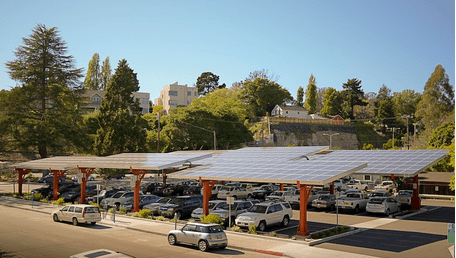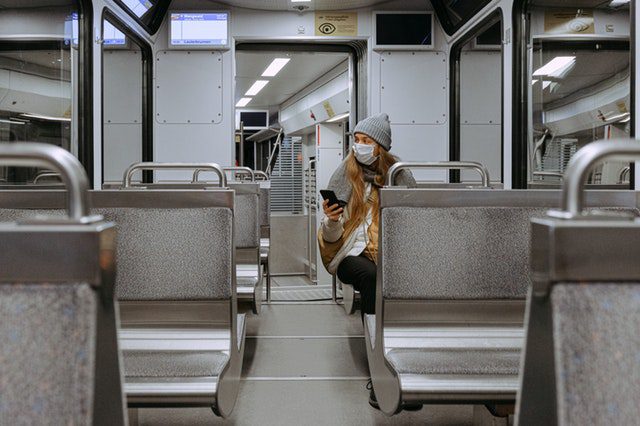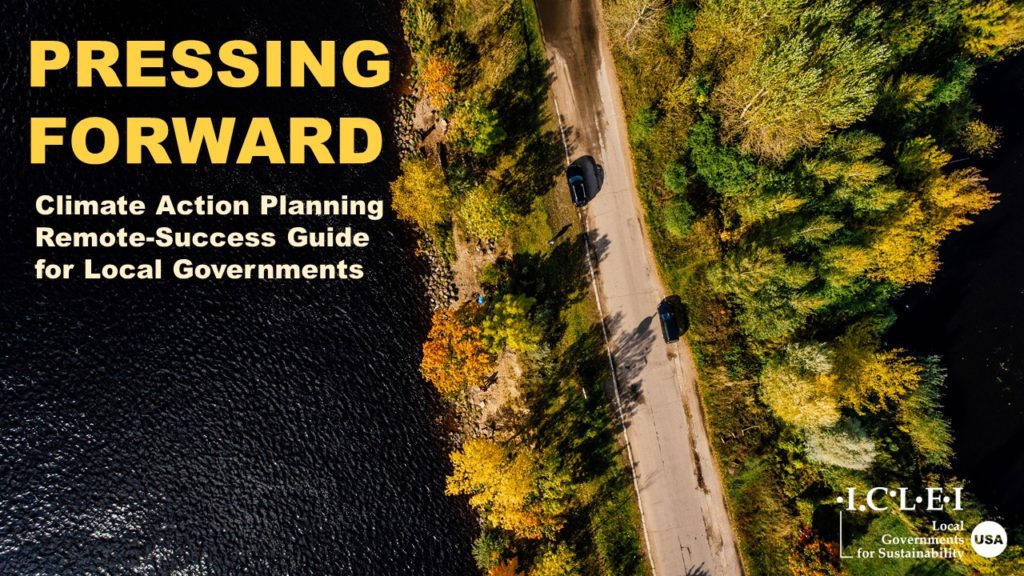During the global pandemic and the associated local health crises created by the novel Coronavirus, local sustainability and resilience staff are experiencing a significant upheaval in their programming, budgets, and daily life. As many are able to switch to remote-working arrangements, uncertainty remains for many of their projects. Here we capture some of the initial insights and adjustments our members are seeing across diverse departments.

Shifting Priorities: City Resilience Staff Step Up
The ICLEI network is vast and varied, with more than a few staff from member communities working for dedicated resilience departments where climate change is considered among a list of threats their jurisdictions must prepare for.
Tiffany Wise-West, Sustainability and Climate Action Coordinator with City of Santa Cruz, CA, is among those who have moved into emergency response. “Because city workers automatically become disaster workers under conditions like these, and I volunteered to help in whatever way was needed, I was recruited into an Emergency Operations Center advance planning team,” Tiffany explains. She anticipates canceled hearings on a building electrification ordinance to prohibit natural gas infrastructure, as well as delays on two deliverables related to sea level rise. “It’s unclear how the grant funders will respond to this,” Tiffany says adding that she’s pressing forward on grant proposals, preparing our climate action task force for our upcoming climate and energy action plan process, and “catching up on email to name a few.”
Some cities already are anticipating how these operational shifts will impact employee mental health. For the City of Tallahassee, FL, where City facilities are closed to the public through at least April and where the Sustainability and Resilience team transitioned to remote work earlier this week, the office is preparing for a period of heightened stress levels. “With an eye on our Resilience Strategy, we’re paying particular attention to vulnerable populations and cyber security,” says Abena Ojetayo, Chief Resilience Officer for Tallahassee. “We’re collaborating more with our Human Service providers who are active in the community mitigation efforts.”
The move away from climate theme work has revealed ironies for some. “The biggest challenge or concern so far has been the temporary loss of bandwidth for non-essential work, which ironically includes climate change,” says Ken Davies, Deputy Director of Climate Smart San Jose, CA. “I totally get it as we work to protect the public, but as those of us that do this work daily know, climate change has the potential to claim far more than this virus, and there are many parallels between the two that indicate reaction to climate change could be even stronger.” Ken anticipates delays for Climate Smart San Jose’s projects for up to six months, depending on the duration of the pandemic crisis.
Going Digital: Local Sustainability Moves Online
For public employees who have not yet experienced so major a shift in their daily duties, many have reported a move toward digital tools, revealing some interesting ways sustainability intersects with technology. As one indication, Earth Day, celebrating its 50th anniversary on April 22, 2020, has moved to an entirely virtual moment, most prominently directed by Earth Day Network.
“My department was one of the first to be able to work remotely, because we are a small team: five 5 full-time employees,” says Alissa Farina, Resilience Programs Manager for City of Miami, FL. “So far my work has been roughly the same, but deadlines have been pushed back, meetings rescheduled, etc. We have only been remote for a week so I imagine the longer this goes on, the more the shape of my work will change.” Like in other communities, Alissa anticipates tha, because her is “Resilience and Sustainability”, she and her colleagues may be called to help with Emergency Support Functions.
Elsewhere in Florida, Chris Castro, Director of Sustainability & Resilience with the City of Orlando has also been clearing digital avenues for his team: “I have been working the last week to lift up digital tools for my team to be able to continue working remotely for the foreseeable future. We have on-boarded the Microsoft Teams and Planner tools to support us in effective virtual communications, project management, file sharing, and more. We have also developed a “Remote Work Continuity Plan” with specific deliverable that all of my staff can work on during their time remote.” The biggest challenge Chris and the City has faced is in maintaining the momentum of various projects with partners. Orlando has a dozen major policies and programs in development, such as contracts for more than 100 electric vehicle charging stations, over 1.5 megawatts of rooftop solar projects, a new solar co-op, electric bus deployments, energy efficiency retrofits of public buildings, and more. “With all this uncertainty, I worry how much of it will stay on time.”
In one small Ohio town is utilizing the downtime of area college students to keep city projects moving. Linda Arbogast is Sustainability Coordinator, City of Oberlin, OH. She reports that the City just lost its 3,000 students but that remote options allow for them to work on hands-on projects to help research and write city ordinances. “An example is working on an ordinance for Oberlin municipality for banning single use plastic,” Linda explains. Still, she shares in the disappointment of her national counterparts in the cancellation of Earth Day events: “ Our 50th Anniversary of Earth Day was going to host events for two weeks. It was a beautiful community and college collaborative time with churches hosting weekly vegetarian potlucks for us to get together and plan. At this point, we don’t see how we can do any of the Earth Day events without the students—but I think we will find ways to do them later on.”

Pressing Forward: ICLEI Supports Remote Success
In an effort to maintain momentum on climate and sustainability programming, ICLEI USA is issuing a series of remote-success “Pressing Forward” packs for local government staff. During the second quarter of 2020, these packs provide ICLEI members with a week-by-week schedule to begin and/or keep progress moving forward on a variety of themes: Climate Action Planning, Greenhouse Gas Inventories, Resilience Planning and Vulnerability Assessments, Ecomobility, Equity, and Sustainability Planning. ICLEI members can ensure they never miss a pack by subscribing. Success packs are posted in the online ICLEI Community neighborhoods.
Because direct-support is needed now more than ever, each ICLEI member is assigned a dedicated technical advisor from ICLEI’s expert staff to shepherd them through trying months. Moreover, our web-based cohort training sessions are on track to deliver technical training to more than 100 , communities this year, In between live meetings, cohort participants remain in contact with each other and more than 450 other local government staff using the online ICLEI Community platform. (Not yet using the platform? Register here.)

Finding Silver Linings
These are the initial steps we are taking to make sure our members are supported and that their hard-won momentum on climate action and sustainability is not stalled. We’ve been through difficult times before, and as ever, ICLEI will remain ready and responsive to the changing priorities of our local governments.
Until more clarity is given, Ken Davies in City of San Jose is turning toward uplifting stories about improved water quality in Venice and increased cycling in New York to find moments of positivity in an uncertain world. Abena Ojetayo in City of Tallahassee points us to a few silver linings from the new work-from-home processes, such as furthering cities’ paperless processes and reducing vehicle emissions related to commuting. “We hope that as we work in these new ways, we might also identify new efficiencies, new ways to save money,” she says. “And perhaps new ways to deliver services to the community.”
Kale Robertsis Senior Program Officer at ICLEI USA, where he serves as network coordinator and provides member cities with technical support on climate, resilience, and sustainability action.